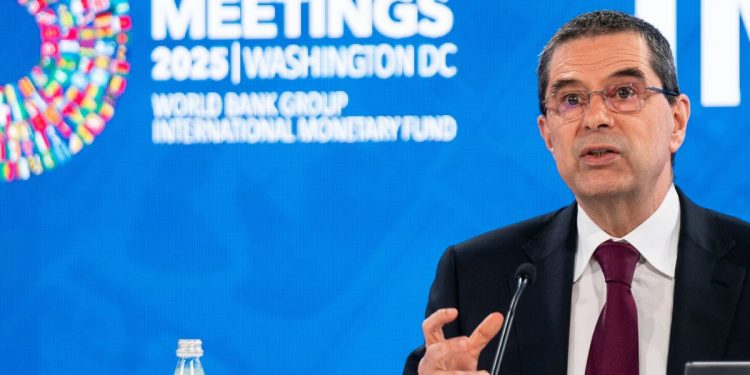- IMF to Ghana and Africa: Spend Smarter, Not Bigger; The Hidden Growth Dividend in Fiscal Efficiency
At the 2025 IMF/World Bank Annual Meetings in Washington, the Fund’s latest Fiscal Monitor delivered a blunt message to policymakers: the key to unlocking sustainable growth isn’t necessarily more spending, it’s better spending. As global debt remains near record highs and fiscal space narrows, the report makes a case that resonates deeply across Sub-Saharan Africa, where government expenditure often tilts toward wages and consumption rather than productivity-enhancing investments.
For Ghana, where the wage bill and interest payments consume nearly 70% of tax revenue, the IMF’s arithmetic reads like an urgent to-do list. The report’s central thesis, that reallocating even 1% of GDP from administrative consumption to infrastructure or education can raise long-term output by 3½–6% in emerging economies, underscores how the country’s next growth dividend might come not from new borrowing, but from disciplined reprioritisation.
According to the Fiscal Monitor, average efficiency gaps, the share of spending that yields suboptimal outcomes, stand at 31% for advanced economies, 34% for emerging markets, and 39% for low-income countries. For Sub-Saharan Africa, this translates into billions of dollars wasted through procurement leakages, cost overruns, and poor project appraisal.
Ghana’s case is no different. While the government has expanded capital budgets under the IMF programme’s growth pillar, implementation inefficiencies persist, from stalled road projects to underperforming education and health investments. The IMF’s model simulations suggest that closing even half the region’s efficiency gap could deliver a growth effect equivalent to a medium-sized stimulus package, without adding a single cedi to debt.
The Fiscal Monitor recommends what it calls ‘smart consolidation’: cutting wasteful administrative spending while protecting and expanding outlays on productive areas such as digital infrastructure, teacher training, and health systems. In Ghana’s context, that means addressing the structural imbalance between recurrent and capital expenditure.
The numbers are stark. In 2024, the government spent nearly GH¢47 billion on compensation of employees, against about GH¢17 billion on capital projects. Yet the IMF estimates that shifting just 1% of GDP from consumption to productive investment could increase potential output by about 3½% in emerging markets like Ghana, and by up to 6% when channelled into education and skills.
Such a shift could be catalytic in Ghana’s medium-term fiscal framework. A more strategic reallocation, from administrative overheads and untargeted subsidies into high-return sectors like energy, logistics, and human capital, could reinforce the country’s post-IMF recovery narrative while easing the debt-service trap that has constrained fiscal policy.
The Fiscal Monitor also highlights governance and technology as force multipliers. Countries that improve procurement transparency, digital public financial management, and project appraisal systems stand to gain an additional 2½–7½% in long-run output, the IMF finds.
Here again, Ghana’s reform agenda is relevant. The rollout of the Integrated Customs Management System (ICUMS) has already improved revenue assurance in trade facilitation. Extending similar digital integration into the broader public finance chain, from budget planning and e-procurement to expenditure tracking, could multiply these gains. The IMF’s message is clear: transparency is not just about accountability; it is growth policy by another name.
“Closing leakages, tightening procurement, and digitalising public finance add as much as 7% to GDP over time in developing countries,” the report notes.
While the technical case for efficiency-led growth is compelling, the politics are more complex. Cutting unproductive spending often means confronting entrenched bureaucratic interests or reining in politically sensitive wage increases. Yet, as Ghana’s 2026 budget looms, the challenge for the Ministry of Finance will be to demonstrate that fiscal discipline and social equity can coexist.
The IMF argues that targeted social assistance, when properly digitised and linked to verified poverty data, can cushion vulnerable groups even as governments streamline inefficient programmes. For Ghana, this could involve consolidating fragmented welfare schemes into a single digital social registry, a reform that both the World Bank and the African Development Bank have backed.
Beyond short-term consolidation, the Fiscal Monitor urges countries to institutionalise spending reviews and multiyear budgeting to lock in efficiency gains. For Ghana, this could mean embedding annual expenditure reviews within the Medium-Term Fiscal Framework and extending cost-benefit analysis to all capital projects above a defined threshold.
Such reforms would not only improve fiscal credibility but also help Ghana signal readiness for eventual re-entry into international capital markets. Investors, after all, prize consistency and transparency, the very attributes that efficiency reforms aim to deliver.
Ghana’s fiscal challenge, the IMF implies, is not just about debt reduction, it’s about value extraction. A smarter budget, one that treats each cedi as a catalyst rather than a cost, could deliver a growth story far more credible than any borrowed stimulus. As the global tide of fiscal tightening deepens, the difference between stagnation and resilience may come down to one question: Can Ghana spend smarter before it needs to borrow bigger?








